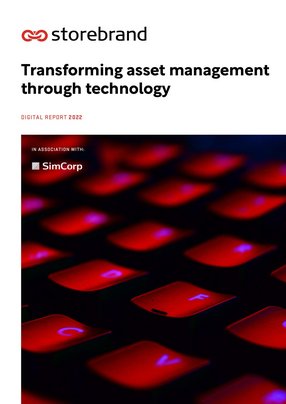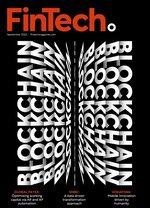Storebrand: Transforming asset management through technology
As the fourth largest asset manager in the Nordics and the largest private asset manager in Norway, Storebrand Asset Management is a robust name in the asset management space. The company, which is a subsidiary of Storebrand ASA, launched in 1981, and has been involved with sustainable investment since the late 90s.
In keeping with its forward-thinking philosophy, Storebrand began its digital transformation journey seven years ago, and is now one of the most technically advanced asset management companies globally.
With a core aim to support Nordic enterprises and initiatives, Storebrand Asset Management (SAM) manages the captive funds (pension schemes) from its life company, provides a wide range of funds and also has multiple strategies that enlists local Nordic partners.
“We have a truly Nordic focus,” says Arne Martin Moen, SAM’s Chief Operating Officer. “In terms of our asset management, we want to be a local Nordic partner. We also want to be what we call, ‘a gateway to the Nordics’.”
Moen, who has a 16-year career in the finance industry, heads up Investment Operations and Technology in Storebrand Asset Management, says the core aims of the company involve generating international exposure to the Nordics and providing services that are relevant for both European and UK customers, as well as supporting ESG initiatives. “We have a long history in the ESG space,” he says. “We've been working on sustainability for more than 25 years, and we want to be a sustainable pioneer. Those are the three positions that we take as a company.”
Digital transformation
At the outset of the transformation, SAM had a very clear strategy in terms of consolidation. SimCorp Dimension operated as the core platform, as the team wanted to avoid using third party ‘best of breed’ systems and, instead, utilise the functionality in SimCorp Dimension as much as possible. Moen describes the move as a massive but deliberate shift for SAM. “If we were going to buy a third-party system, it had to be a well defined decision. So we decommissioned a lot of systems and migrated everything into one place, which now gives us an advantage in terms of data consistency and data integrity.”
The team was also aware of the fact that legacy systems were not geared up to keep up with the data and changes in the business environment. “By introducing more standard types of systems, it was easier to attract the knowledge that we needed and the people we needed. Gradually, we came to a point where a lot of the functionality was on the platform and we could work on enhancing that.”
By 2020, the team started working on the IT infrastructure, which is when they made the decision to move the entire infrastructure – including all the SAM servers – to the cloud. The shift was a complicated process, and it was not without its challenges, but the end result has been worth the journey.
“We spent 2020 – and half of ‘21 – migrating all of our funds and all of our systems, which was a thousand billion Norwegian kroner, into the cloud. It’s been a great success, and great working together with our partner, Microsoft and our vendors,” he says. “We managed to migrate without any big issues. There were certain hiccups, but we managed to gradually take them on as they came.”
Nurturing a culture of digital development
While SAM has completed much of the heavy lifting on the platform side of transformation, the company is now starting to focus more on the client space, the client interface, the internal client's interface, and the actual processes of client servicing. The entire journey has required a culture of open mindedness towards innovation, according to Moen.
“It's very important to have that culture; I don’t think it’s even possible to change if it’s not part of the organisation’s philosophy. Embracing change needs to be anchored with the top management, and SAM has that. It’s also important to have pioneers who are interested in new technology, and who want to explore and develop new things to help the company move forward. It’s a long process though, and we need to balance the risks and the rewards.”
Sustainable investing as a strategy
While the global focus on ESG and green investing is a relatively new movement, Storebrand have been involved with the space since 1995. Sustainability has been a priority for the whole group, which has focused more recently on launch new products focusing on solutions, renewable energy, fossil free, equal opportunities and smart cities. Which are all geared towards ESG-specific investing.
As part of the strategy, SAM works closely with the companies it invests in, voting at the AGMs, working directly with the companies, exclusions and transitions. In 2020, the company collaborated with other investment companies to approach the Brazilian government address the issue of deforestation in the Amazon. “We believe that our size, and the funds we invest, can be used as a vehicle to push things in the right direction when it comes to sustainability.”
He continues: “It's been high up on our agenda for decades. It is an integral part of the whole group and the whole company. ESG is part of everything we do – for example, in our sourcing processes, ESG for the vendor selection is an important part. We focus on internal carbon footprint and make sure we take all the measures we can to move in the right direction."
Trends in the asset management space
The asset management industry, as well as transitioning globally, is experiencing a number of disruptive trends. Moen believes that, front and centre in these trends, is the collection of data. And it is just as important to both sides of the business, with more customers than ever before requesting more structured data.
Insights is another area that has seen a big shift, with clients requesting deeper information on assets – especially when it is related to ESG. “I think environmental and social governance is a good example when it comes to looking at disruptive trends, because people want better transparency and authenticity. They want to see that what you claim you're doing, is what you're actually doing. Companies need to display that now using data in a much better and more efficient way than was previously possible.”
Accessibility is another area he believes will shape the asset management industry moving forward. “I think people want things that are very easily accessible. Because customers can get anything whenever they want it in their personal lives – on their phone or on their laptops – this sense of immediacy carries over from other areas. Companies therefore need to turn around quickly and deliver fast.”
Personalisation of services as well as the ability to scale fast are two more trends Moen and SAM are working to fulfill. These will define successful asset management and investment companies in the near future, with automated technology becoming a crucial part of any developing entity. “Tailored products and services are now an expectation and, because of that, you need to give people customised reports without the manual labour. Therefore, to be both successful and error-free, it must be done automatically.”
The digital ecosystem
Forging a strategic partnership is key in making sure a number of technologically complicated procedures can be carried out quickly and efficiently.
SAM has two key partners: namely SimCorp and BMC, both of which provide invaluable services. SimCorp has been an integral part of SAM’s development, with the company using their product since 1998. “It's at the core of our investment operations,” says Moen. “And also it's a front to back system whereby the portfolio managers will typically manage their portfolios. It handles all the day to day transactions, the accounting, the broker records, the reconciliation where we get data for reporting, performance, risk and more. We use it every single day, and it's a very important system for us.”
Meanwhile, BMC has been instrumental on the scheduling side of things. Moen describes it as an orchestrator tool for all asset management tasks and procedures. “We receive and send a lot of data every single day. We've built this around the Control M solution, which helps us pull in data from a lot of different vendors. Then we do all our calculations and massaging of the data, and then we send data back out to different sources and to different systems.”
Finally, during the digital transformation process, SAM partnered with Microsoft Azure, which provides the company with its cloud solution. “We also use their reporting tools, such as Power BI, along with data tools that they have.”
Asset management and fintech
Moen is clearly proud of SAM’s progress, attributing the successes to a team that consistently embraces the latest innovations and isn’t afraid to change the way they do things. This, he says, hasn't always been a common attitude within the investment industry – which is why it's a sector that is seen as lagging behind other fintech sectors. Nevertheless, the future is, he says, looking bright, with an increasing number of innovative disruptors influencing change in the space.
“There have been other industries that have been frontrunners in terms of technology and fintech. But, I think we now see a shift where there are a lot more players in the market. There are also far more companies providing specialised tools, services and setups that help the investment community and the investment management industry to take the next step in terms of digital advancement.”
He adds that one of the most exciting things about advances in technology is that the process of digital transformation will never be complete, because there will always be newer and better ways of doing things emerging.
“I don't think we're going to get to a point where we're done. I think there's always something new, so we will keep up the pace and hopefully end up in a place where we have even better scalable processes, as well as end-to-end digital processes. Our main goal is to give our clients or any interested parties the insight into our data and our analytics, so we can communicate with people using technology and using data sets in a much more efficient way.”



